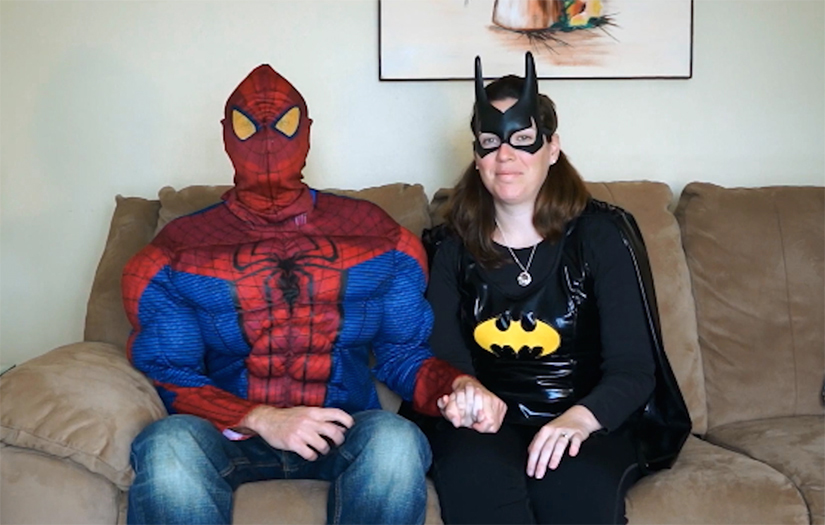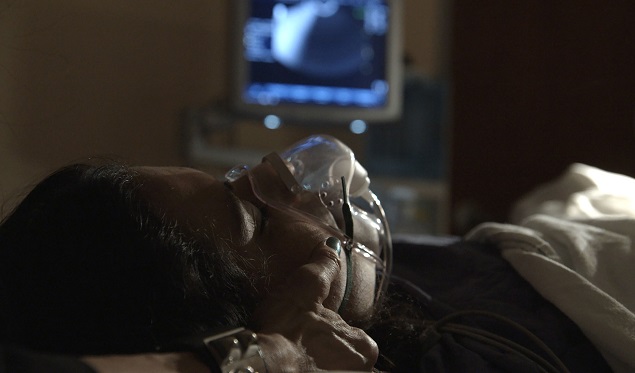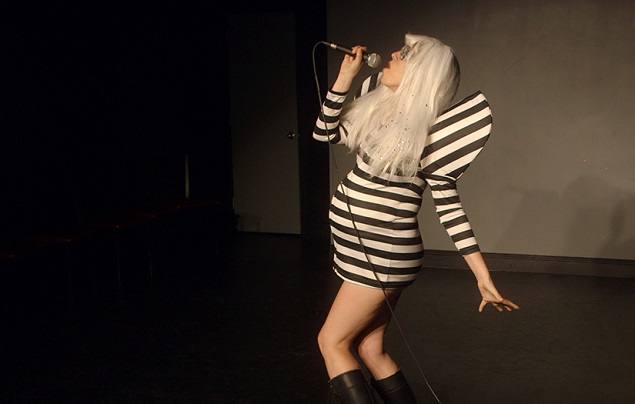Tribeca Interviews: ‘haveababy’ Shows ‘Winning’ a Child Still Brings Challenges

Contestants prepare to fight the “supervillain” of infertility in haveababy. Photo courtesy of Runaway Films.
Infertility isn’t something typically taught in sex ed. For Oscar-nominated director Amanda Micheli (La Corona), it wasn’t an issue she knew much about until she and her husband struggled for three years to conceive. She’s not alone: one in eight couples has difficulty getting pregnant or sustaining a pregnancy according to Resolve, the National Infertility Association. It becomes a matter of choice: how many sacrifices can be made by a family who desperately wants a daughter or son?
Aside from fostering or adoption, IVF (in vitro fertilization) is an option to conceive naturally, a procedure that is gaining more traction: over 5 million babies have been born through IVF in the past 35 years. Greatly wanting a child, Micheli and her husband were willing to use part of their savings for the first round of IVF. IVF is not guaranteed to work the first time; after it didn’t take for Micheli, she began looking into options to finance another cycle of treatment.
A single round of IVF isn’t cheap — it can average $20,000 with less than a 30 percent chance of being successful. Insurance often doesn’t cover IVF, making it an unexpected financial burden. To alleviate costs, Micheli even considered moving back home to live with her family in Massachusetts due to the state’s law requiring insurance companies to cover fertility treatments.
Through her research she came across a contest from The Sher Institute for Reproductive Medicine called “I Believe” — the inspiration for her film haveababy that debuted at the 2016 Tribeca Film Festival. Since 2011, the national center (with Micheli’s focus on the Las Vegas, NV office) has held an annual contest to win a free cycle of IVF treatment. What started as an essay application the first year soon evolved into a video competition — contestants uploading their stories on YouTube became an easier platform in spreading the message to a wider audience. In four minutes or less, these videos detail their years of struggles and hopes attempting to have children, all for a chance to be treated by Dr. Geoffrey Sher. Dr. Sher is the founder of the first private IVF clinic in the U.S. and is credited with the births of over 18,000 IVF babies.
Although Micheli did not enter the contest herself, she saw it as an unusual and provocative lens that furthers awareness of infertility struggles. Being unable to conceive can run the gamut of emotions; feelings of loss, disappointment and desperation, but also a flicker of hope that one day a baby will come. Micheli said she hadn’t seen a lot of infertility coverage that seemed cinematic, so she created haveababy.
Who does infertility affect? Micheli’s goal was to show that it could happen to anyone. Infertility does not discriminate based on race, sexual orientation or religion. The finalists featured in the film are a biracial couple who suffered past miscarriages, a Catholic couple who have tried several rounds of IVF prior to the contest and a Lady Gaga impersonator who identifies as a lesbian.
In exchange for sharing their stories, Micheli agreed to tell her personal infertility struggles through a series of videos that will be released later this year. Currently, it’s not public information how Micheli’s journey with IVF has continued or ended.
Micheli talked with GALO about why it’s easier to speak out about cancer than infertility, how she decided which finalists to interview, and how she felt about creating videos reflecting her personal connection with IVF.
GALO: I saw that your Kickstarter campaign to create haveababy raised $50,000 in 28 days. Do you usually use Kickstarter to fund your projects?
Amanda Micheli: I had never used Kickstarter before. I’ve been making films for a long time, but this is the first time I’ve made a film with the power of social media. It’s just really incredible with the landscape for promoting and fundraising.
GALO: How long did it take you to film haveababy?
AM: It was about two and a half years of filming — truthfully, I think you need this amount of time, and we were willing to wait longer for people’s stories to resolve.
GALO: How did you choose which three of the 10 finalists to film?
AM: We filmed with seven of the 10 — and it was hard to choose. I was really compelled to use everyone’s stories, and it’s a common challenge when you’re making a film to drill down to very economic stories, stories that are compatible with each other and make a unified whole. We decided to stick with the people who would not give up and pursued treatment come hell or high water, which is not necessarily the norm. There was so much geographic, cultural and racial diversity with the finalists. There were some people we were really compelled by, but they weren’t up for the immense emotional journey of having a camera there while you experience it all.
GALO: In a post you shared on the haveababy Facebook page, you mentioned that you and your husband speak openly about his remission from cancer but that you rarely talk about infertility. Why do you think it’s easier to talk about cancer than infertility?
AM: I think there’s so much more awareness around cancer. Also, let’s be honest, cancer can be life or death so there’s an instant empathy there. With infertility, there’s a lot of misinformation and stereotypes. I think because it’s typically not covered by health insurance, medical treatment of infertility is seen as an elective. It’s been seen as a selfish pursuit and people will just ask, “Why don’t you adopt?”
That can be seen as dismissive, it lacks understanding of the complexities of the issue for someone facing a fresh medical diagnosis. You have to grieve the loss of your own fertility before moving on to alternate paths to parenthood. We’re partnering with RESOLVE, a national fertility organization, to spread the word. When it happens to you, you feel alone. It’s very private. It’s about loss. It can feel very isolating.

Rosalinda Patlan gambles on IVF in haveababy. Photo courtesy of Runaway Films.

Athena Reich, a contestant in haveababy, makes a living as a Lady Gaga impersonator. Photo courtesy of Runaway Films.
GALO: In the film, Athena Reich (Lady Gaga impersonator) said, “It’s easier to come out as a lesbian than infertility issues.” The idea of “outing” oneself about infertility is very interesting; could you explain more about that?
AM: I think that’s a compelling part for me and my experience. Part of releasing this film is me coming out with this personal story. It’s hard for different people for different reasons. Trying to have a family, procreation, sexuality: it really speaks to the primal parts of ourselves, but also the socially constructed parts of ourselves. It’s always amazing to me how charged people’s responses are. There’s a lot of judgment out there. People have an opinion about everything, and especially about childrearing — how to choose to have a family. It’s different for every person, but coming out about infertility can feel risky since people don’t talk about it. National Infertility Awareness Week is April 24-30. We’re using the hashtag “#niaw” to encourage people to speak out, ask questions and have a dialogue.
GALO: How was it being on the other side of the camera and filming your own story in a series of video diaries? Have they been released yet?
AM: Oh God, it was awful. It was really hard for me. I mean, there are two stages of that: there’s the filming and the distribution of it. We’re not going to put them out until the film has broader release, but I’m going to take the leap. I’ve filmed but I haven’t edited. I’m scared; I’d be lying if I said I wasn’t. It’s one thing to talk about it, but it’s another to film it.
GALO: The haveababy Facebook page has a lot of activity with posts about IVF related topics and numerous enthusiastic responses. Were you expecting as much feedback as you’ve received?
AM: To be honest, I’m not surprised at all. That’s what I immediately latched onto with these fertility communities who are looking for help, support and connection, since a lot of people don’t have that in real life. That’s part of what made the contest so unique is that all these people are just desperately reaching out for some kind of connection. They want a witness to what they’re going through and some kind of solution.
I’m hoping that our Facebook page will be a hub for people to have a productive conversation; being interactive, sharing stories and making meaning of that. Some people end up having a baby through this contest, some don’t. Some are childless and some consider adoption, which is its own journey and challenge.
GALO: Do you think that Dr. Sher’s patients were willing to open up their lives to you in part because you were going through IVF yourself?
AM: Absolutely. I’m trained as a documentary filmmaker, but this was such an intimate subject matter. Since there tends to be some judgment and criticism around it, I think it made a big difference for them to know that I had been going through it myself. I made a promise that if they shared their story with me then I would share my story with them after the film came out. This was a mutual project, a collaboration. We’re all coming out together, and I hope they all feel good about their choice to be in it.
GALO: In the film Dr. Sher said, “For those who say this shouldn’t be a contest, they’re correct. This should be insurance.” Do you agree with that?
AM: I think that most insurance policies don’t cover infertility. The fact that it’s out of pocket contributes to the stigma that it’s an elective like plastic surgery. If there were more health insurance policies, including IVF treatments, there wouldn’t be a need for the contest. If people had health insurance, they wouldn’t be baring their souls online. But they are and the awareness is spreading.
“haveababy” had its world premiere on April 14 at the 2016 Tribeca Film Festival.
